Global Warming Will Impoverish Oceans
Rising temperatures and acidification threaten to create a hostile ocean environment that will cause a serious collapse in the food chain.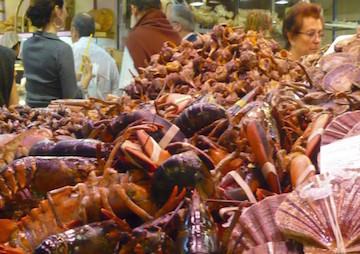
By Tim Radford, Climate News Network
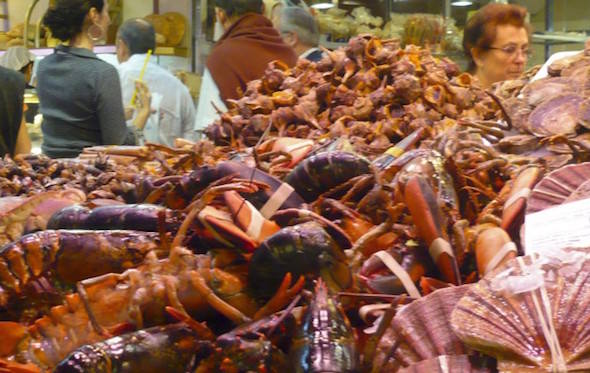
Some economically important species, such as shellfish, will suffer from warmer oceans. (Andy Mitchell via Wikimedia Commons)
This Creative Commons-licensed piece first appeared at Climate News Network.
LONDON — Ocean ecosystems and fisheries could be at risk of collapse under the combined assault of global warming and increasingly acid seas.
This bleak image of impoverished and increasingly hostile oceans emerges not from any one new study of human impact on the 70% of the planet that is covered by water, but from a long cool look at the big picture so far.
Marine biologists Ivan Nagelkerken and Sean Connell, of the University of Adelaide in Australia, report in the Proceedings of the National Academy of Sciences that they examined the results of 632 experiments published in scientific journals.
These studies covered the entire spectrum of waterworld habitats — the polar and temperate seas, the open oceans, the tropics, the coral reefs, the kelp forests, the marine estuaries, and the fishing grounds.
Long-term consequences
They looked at the potential long-term consequences of oceans ever richer in dissolved carbon dioxide, as humans burn ever more fossil fuels and emit greenhouse gases that continue to warm the atmosphere.
This kind of meta-analysis has proved a useful way of drawing clear overall conclusions from a vast mosaic of often conflicting or ambiguous findings.
So while warmer oceans and a more fertile atmosphere might accelerate some kinds of plankton bloom, the seas could become too acidic for tropical micro-organisms.
While the herbivorous species that depend on green growth might do better in some waters, the carnivores — which make up an important part of the fishing industry’s haul — might be at risk.
Some economically important species will be able to move to cooler waters, but shellfish and other important catches with a limited range could suffer.
There is a mismatch, with less food available for carnivores. There will be a species collapse from the top of the food chain down
Overall, the two scientists report, marine diversity will be reduced. So too will be the abundance of those “key species” that underpin the normal functioning of the marine ecosystems that have, historically, supported a rich variety of fish, shellfish, marine mammals and corals. In other words, the oceans will become impoverished.
“With higher metabolic rates in the warmer water, and therefore a greater demand for food, there is a mismatch, with less food available for carnivores — the bigger fish that fisheries industries are based around,” said Dr Nagelkerken. “There will be a species collapse from the top of the food chain down.”
The two scientists restricted their investigations simply to studies or experiments up to early 2014, based on the higher temperatures or carbon dioxide levels predicted for the end of this century.
They tried to measure the predicted direction and magnitude of change, and its impact on marine productivity, species diversity and ecological function. And then they used statistical tools to test the reliability of their findings.
The phytoplankton findings are vital. These tiny green diatoms generate nearly half of all the planet’s primary production — that is, the food on which all other diners must ultimately depend.
Deep-sea denizens
They then looked at the challenges that warmer oceans delivered for crustaceans, molluscs, sponges, deep sea invertebrates, the warm and cold water corals that provide habitat for one-fourth of the ocean’s variety, the pelagic or surface-swimming fish, and the demersal or deep-sea denizens that live longer, reproduce more slowly and are thus less likely to evolve and adapt to changing conditions. And, importantly, they considered the combined effects of temperature change and increasing ocean acidification.
“We know relatively little about how climate change will affect the marine environment. Until now there has been almost total reliance on qualitative reviews and perspectives of potential global change. Where quantitative assessments exist, they typically focus on single stressors, single ecosystems or single species,” said Professor Connell.
“This analysis combines the results of all these experiments to study the combined effects of multiple stressors on whole communities, including species interactions and different measures of responses to climate change.”
Your support matters…Independent journalism is under threat and overshadowed by heavily funded mainstream media.
You can help level the playing field. Become a member.
Your tax-deductible contribution keeps us digging beneath the headlines to give you thought-provoking, investigative reporting and analysis that unearths what's really happening- without compromise.
Give today to support our courageous, independent journalists.
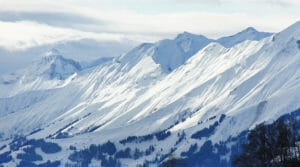
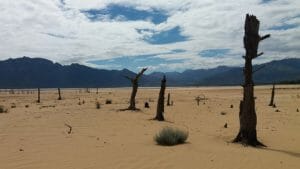

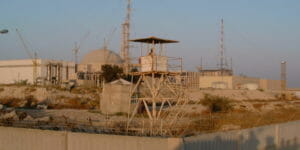


You need to be a supporter to comment.
There are currently no responses to this article.
Be the first to respond.